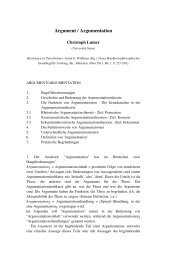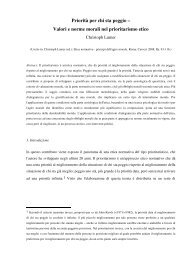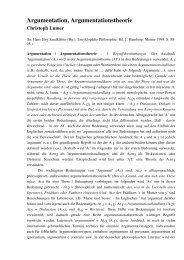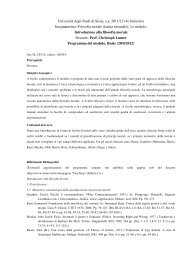What is Practical Knowledge? - Prof. Dr. Christoph Lumer
What is Practical Knowledge? - Prof. Dr. Christoph Lumer
What is Practical Knowledge? - Prof. Dr. Christoph Lumer
You also want an ePaper? Increase the reach of your titles
YUMPU automatically turns print PDFs into web optimized ePapers that Google loves.
<strong>Lumer</strong>: <strong>What</strong> Is <strong>Practical</strong> <strong>Knowledge</strong>? 15full information <strong>is</strong> another form of operationalizing ep<strong>is</strong>temic rationalization. Therefore, the fullinformationapproach seems to be akin to the analytic-synthetic approach just proposed.Notwithstanding th<strong>is</strong> and some other similarities, the two criteria are quite different. First, therespective objects of ep<strong>is</strong>temic rationalization are different. The criterion of the full-informationapproach <strong>is</strong> to be applied to all actions and preferences, and the knowledge to be used <strong>is</strong> knowledgeabout the features of the various options to act, whereas the analytic-synthetic approach proposedhere applies the 'stability with respect to new knowledge' criterion only to ways of deciding(including intrinsic preferences); and the knowledge that eventually may undermine th<strong>is</strong> stability <strong>is</strong>not limited a priori; however to a great extent it will be meta-knowledge about the various ways todecide. Second, the full-information approach <strong>is</strong> hol<strong>is</strong>tic; it speaks of a certain input, namely fullinformation, and of the respective output, i.e. the preference between two actions; it does not speakof the deliberation in between. The analytic-synthetic approach, on the other hand, has been namedso prec<strong>is</strong>ely because of the analys<strong>is</strong> of the exact ways to decide and because of the meticulousprescriptions of how we should decide. However, the particular features of the full-informationaccount involve several d<strong>is</strong>advantages compared to the analytic-synthetic approach, wherefore thelatter has been adopted here. First, people are never fully informed; and if they were they could notrepresent vividly all th<strong>is</strong> information during the actual dec<strong>is</strong>ion phase of the deliberation (they mayswitch between several vivid representations and thus also between inclinations towards the relatedoptions). Therefore, we cannot observe how people with full information decide and hence cannotproject what their preference in a particular case will be on th<strong>is</strong> bas<strong>is</strong>. Th<strong>is</strong> implies that we cannotknow which preferences are rational and which actions are good, according to the full informationapproach. Second, assuming that someone has full information about some options, the fullinformation approach does not tell us how to decide on th<strong>is</strong> bas<strong>is</strong>, i.e. it does not fulfil its adv<strong>is</strong>oryfunction. Third, because the full information approach presupposes full knowledge it cannot dealwith dec<strong>is</strong>ions and options that essentially presuppose some sort of ignorance -- like actions ofinformation procurement, actions aiming at providing excitement and surpr<strong>is</strong>es (e.g. reading amystery story).So far only the strategy for determining the prudential part of practical knowledge has beendealt with; now some indications regarding the moral part shall be given. One consequence of theabove critic<strong>is</strong>ms of Kantian<strong>is</strong>m and moral real<strong>is</strong>m <strong>is</strong> that because practical reason or moralitycannot create motivational mechan<strong>is</strong>ms, the determination of criteria for moral dec<strong>is</strong>ions and moralknowledge has to rely heavily on empirical information about how dec<strong>is</strong>ions in favour of moralactions proceed or may proceed. Together with the content skeptic<strong>is</strong>m about practical reason (i.e.that pure practical reason cannot establ<strong>is</strong>h practical relevances) th<strong>is</strong> leads to foundationalinternal<strong>is</strong>m (cf. sect. 2), which holds that the content of morality has to be establ<strong>is</strong>hed on the bas<strong>is</strong>of pre-ex<strong>is</strong>ting motives. Furthermore, because the theory of prudential practical reason andknowledge already fairly generally establ<strong>is</strong>hes which kind of knowledge <strong>is</strong> rationally motivatingand because moral knowledge should not and cannot run counter to prudential rationality, thecontent of moral practical reason and knowledge can only be establ<strong>is</strong>hed within the limits ofprudential rationality.





![Vorwort [Biographie und Laudatio Wolfgang Lenzen]](https://img.yumpu.com/40262871/1/184x260/vorwort-biographie-und-laudatio-wolfgang-lenzen.jpg?quality=85)

